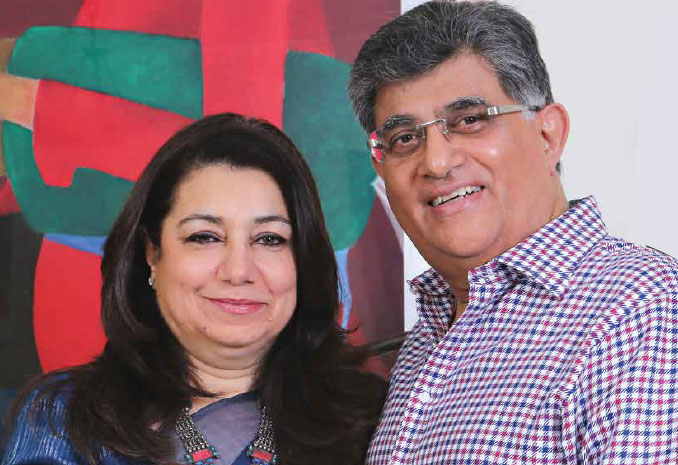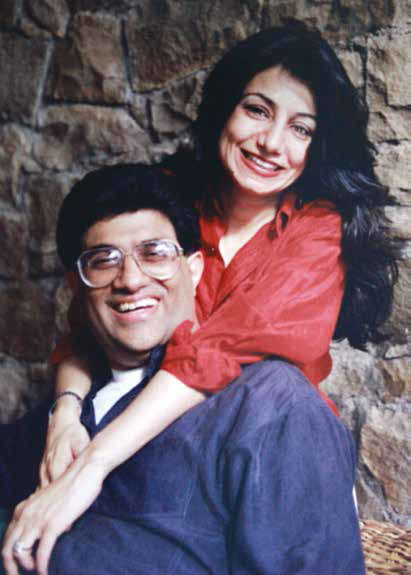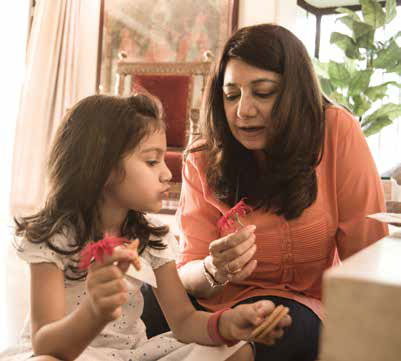Issue No. 7 / April 1,2015

asks Mukesh Malhotra Managing Director of Weikfield Group, as he settles down into his chair behind the huge, solid wood desk in his plush office. A beautiful painting adorns the wall behind him and it has been painted by his childhood sweetheart and wife Ritu Malhotra, 20 years ago. This has already set the trend for what is to unfold – a story of strong family bonding and values which has kept the couple grounded, simple and spiritual. The beautiful and graceful Ritu joins us. I have known them to be gracious hosts to friends at their beautiful home where Mukesh, a wonderful singer, croons his favourite English and Hindi numbers while Ritu delights us with her culinary expertise. They look equally relaxed and open in the new Weikfield Corporate office in Viman Nagar, Pune, and why shouldn’t they? They have been in this journey together for well over 40 years.
We agree that we should start from the beginning. Both Ritu and Mukesh have done and learnt so much in the journey of life and that is what they should be sharing. I have known Ritu to be a deeply committed person who has helped thousands to discover their personal sense of worth and value within themselves. Mukesh has supported her in this cause.
“My family came to India from Pakistan as refugees and they were struggling hard to set themselves up when I was born in 1952. We first had a shop at Main Street in Pune and my family set up the food business in 1956. The business grew slowly and with a lot of hard work by my father and uncles and I grew up with the business,” begins Mukesh.
The family did not believe in providing short cuts for success. At the age of 12, Mukesh’s hands-on training into the business had begun. Young Mukesh was working at the factory at the weekends, and during his holidays, he accompanied his uncle on business and sales tours to learn a little more. The grooming into the business continued well into his college years as well. “College started at 11.30 am. So I went to the factory at 7.30 am and then to college.”
He confesses that he made a very important stop on the way to meet his sweetheart, the young and stunning Ritu who was then studying psychology in Wadia College. “Despite all these distractions I did well both at the factory and at college,” jokes Mukesh.
By the time he joined the business he had some pretty good grounding. He started with the stores and worked his way through various departments – production line, purchasing, sales etc.
When he joined the business, he spent a year and a half sitting with his uncle, Bahri Malhotra, who was the Managing Director at that time. He and Ritu got married in 1973. “Our company was doing well in India, and different parts of the business were handled by different members of the family. There were no exports at that time. And honestly I loved to travel and I still do. In the 70s there was no scope to travel abroad except for business. So I figured that if I started the export division I would get to expand the business and travel as well,” shares Mukesh.
Since we are in the office, Mukesh is also attending to urgent work as his staff walk in to brief him about something. This gives me an opportunity to talk to Ritu.
Ritu married at the young age of eighteen and a half into a large joint family. “When I got married to Mukesh and came into the family there was only one feeling within us all – that we must all work together for our family, for our personal relationships and our business relationship. The togetherness and working in a harmonious whole was very important. We all lived together. Our dining table had 22 chairs and we all sat together to eat.” says Ritu. “To me as a young person coming into a family, these were big lessons in not just discipline but a feeling of oneness. Your happiness is my happiness and your growth is my growth, is what I learnt.” She admits that there was a certain security being under the large umbrella even though at times they chafed at that. “After all we did not have the kind of freedom that our kids had. We always had to consider a larger picture before exercising our will,” she says.
“You know she walked into a family with three mothers-in-law and three fathers-in-law,” pipes in Mukesh, who finished attending to his work.
To me as a young person coming into a family, these were big lessons in not just discipline but a feeling of oneness. Your happiness is my happiness and your growth is my growth, is what I learnt.
- Ritu Malhotra
I will never forget the first lecture that my father gave me in 1973 when I first joined business. It was simple. He said, ‘Business means both profit and loss. If you do not have the ability to bear losses, get a job. Then business is not for you.’ This advice did me good.
- Mukesh Malhorta

They look back to say that not only did they learn to cope but to feel capable in a few years. As a team they felt they could manage anything and everything. They both developed capabilities which otherwise they would not have.
Recalling his early travel days to set up exports for the company Mukesh says, “When I was building the export part of the business, there were crazy hours and travel schedules. I would be gone for 40-60 days sometimes and did two to three such trips in a year. It was not just about booking orders abroad. It also entailed coming back to India and making sure that the orders were processed and delivered to spec and on time. I was working crazy hours. I do not remember bringing up the kids at all. Ritu did a fantastic job of it singlehandedly. I am trying to compensate for it by spending time with my grandkids”
“My father, S.P. Malhotra, was the patriarch. The first thing that we learnt in business was the need to be organised. We all knew where we stood in the business. Although ours was a family run business there were specific principles that we all had to abide by. We always had official board meetings, often in Blue Diamond, despite the fact that we all went back to the same home. I will never forget the first lecture that my father gave me in 1973 when I first joined business. It was simple. He said, ‘Business means both profit and loss. If you do not have the ability to bear losses, get a job. Then business is not for you.’ This advice did me good.”
Mukesh talks about the time when around 10 years down the line, around 1982-83, as part of diversification the company set up a bulk drug unit. He built a state of the art unit in less than 10 months and just as they began production, the bulk drug was banned all over the world. They had to shut shop. Having burnt their fingers they did not want to go ahead with any other drug and suffered huge losses. But they had learnt not to give up when there was a loss. And despite the setback they kept the plant in good condition and finally sold off the plant at a profit.

Ritu took up advanced study in psychology in America. There was also a spiritual stirring in her which got her to study metaphysics. “I knew that the family I was in was a gift and it was up to me what I did now. This umbrella of a large and loving family was a stepping stone for something I needed to do. If I did not do this, who else would? In that sense, I never took my work which is essentially spiritual in nature, as a business venture, but a passion. That was the time I set up the Ajna Center for Learning, for people who wished to look deep into themselves and their lives,” expresses Ritu.
Mukesh was supportive of Ritu’s passion for higher studies and healing. “It was quite early on that she expressed the desire to do these courses in America. It was good that she sought her own growth. It kept her busy and gave her so much to do. We both knew in our hearts that at some point of time the kids would grow up and be on their own. It was good that she started when she did, because by the time the kids grew up and flew off, she had a passion in her life which she could continue with. On a lighter note, it also kept her out of my hair. She also could appreciate my tedious working hours. She never complained about my coming home late from work, since she was busy herself.”
Ritu set up Ajna Center in 1987. Along with Dr Warren Stagg, Ritu has been teaching and practicing metaphysics for over 25 years. They run intensive training courses for life coaching every year, in India and around the world and also conduct private sessions and corporate workshops. Hundreds of students have learnt life coaching under their able guidance and thousands have benefited through personal sessions with Ritu. She elaborates, “At some point we all are looking at reducing stress in our personal and professional life. We feel stuck, suffer from low self esteem, there are children with academic learning disabilities including dyslexia, some are battling childhood sexual abuse, as teenagers we are confused. Just about anyone who wants to make a difference in their lives – we help them to help themselves.”
Only when one recognises the value of themselves can they do wonders. We are in the process of doing that at Ajna. It is a nice way to grow
- Ritu
It is only when employees give an organisation more than what they draw from it, that an organisation can sustain and grow
- Mukesh

His family invited a lot of religious and spiritual leaders home. “We had Osho, Swami Chinmayanand, Prabhupada, Satya Sai Baba and many others who visited us for lunch along with a whole lot of their disciples. Then of course it would follow with a satsang in our house which we all sat for. So rituals, religion, spirituality were all a part of our lives even as children.
Mukesh’s tryst with spirituality took a major turn when he went to Igatpuri for Vipassana. The 10 day meditation camp proved to be a rebirth, Mukesh says. “It was a pure experiential way of learning. I understood what it meant to ‘know thyself’. I saw many things change in myself.”
The practice of this meditation every morning gave him clarity to
look at things.” If during the day there are things that confuse me, I
usually arrive at clarity the next morning during practice.”
The duo have stayed grounded due to their initial grooming by their respective set of parents on how to make the best use of what one has at any given point of time. They enjoyed decorating their home with their own creativity and innovation. Tony recalls how they worked on the front door of their house. Ritu’s eyes light up as she says, “Tony, do you remember how we did the enlightened rocks?” For their first home in Kalyani Nagar, the duo worked on making fiber glass rocks and they put a light inside them and called them enlightened rocks. Mukesh nods in agreement and adds that when they had limited budget to do up the interiors of their house, he would look up something he liked and saw how it could be recreated within his budget.
Mukesh grew up learning the business from his father and uncle, the conventional way that business families groom their wards. “Business was discussed at the dining table during lunch and dinner. And after dinner we moved out of the dining room to discuss some more business. That’s how we learnt. My son Akshay however, went abroad to study business. And before he came back I told him to pick up a job so that he could learn at someone else’s expense. He worked in the food industry for more than three years and then came and joined the family business. He had worked in sales, so he was ready to take up work in the family company.”
It was the vision of his father that took the company into infrastructure and real estate which gave rise to another successful venture – Malhotra Infrastructure and Real Estate. So while the food provided the income for the family, real estate helped in creating wealth.
And to be able to share all that they created, the Malhotras started the Malhotra Weikfield Foundation that they have set up to promote science in rural Maharashtra with special focus on girls. There are some boys too who enjoy the benefit of scholarship from the foundation. “We felt science was a neglected area and there were not enough people focusing on pure sciences. The girl child is largely neglected, especially in villages. “
Foundation Fellowships are awarded for M.Sc post-graduation courses and B.Sc graduation courses for the duration specified by the University in any of the Pure Sciences – Physics, Chemistry, Biology, Mathematics, Statistics, Astronomy, and Astrophysics.
The scholarship they run is different from the usual programs in the way that they don’t just stop at providing financial help. Ritu, along with her sister-in-law Priti, runs the mentorship program where every student has a mentor who keeps in touch constantly with the beneficiaries, ensuring full support and holistic development of the beneficiary. They are not academic mentors.
“We are working on giving them an exposure that they will never have in their families or villages. To give you an example, one of the mentors took her student to a fancy restaurant where they ate with cutlery, which was a new experience for the student. She was surprised with all the extra food that she had ordered. These mentors are specifically chosen, and they develop a good rapport with the students. They are in constant touch to give them mental support and guide them on small things.” Such mentorship helps the student to develop rapport with their mentor which in turn helps build confidence.
The beneficiaries also have access to academic mentors who are professors teaching across various colleges. The students send in their questions through an SMS and it is forwarded to the professors who then send the reply. The foundation effectively uses technology to get these students to be in touch with their academic mentors. What began with 16 girls as beneficiaries has 124 students now. Around 600 girls have benefitted so far.
The Foundation holds two to three workshops every year and places 8-10 internees with NCL during the vacations. They work under a scientist to understand what science really means beyond theory. Many students have gone on to do PhDs through scholarships and some have even gone abroad for research and further studies through scholarships. The foundation gives these students Rs one lakh for visa, ticket and shopping for essentials. They have six students abroad.
“We have a girl who is working on an innovative nanotech paste. It is unbelievable that a daughter of a farmer is now researching on cancer cure. I introduced her to Dr. Mashelkar who was also very thrilled. These are farm hands. In fact one boy came from a family which made a living through crushing stones on roads. They even had no home of their own. He went on to do research.”
We have a girl who is working on an innovative nanotech paste. It is unbelievable that a daughter of a farmer is now researching on cancer cure
- Ritu
Mukesh does not believe in looking back and says there are no regrets, “I am too much of an existentialist. I know and believe that everything happened for a purpose. There are no regrets and what-ifs. What matters is what we are doing right now.”
Talking about their vision, the duo feels that skill development is the need of the hour. Young kids who are bright but not too good at academics need to be taught some skills. Mukesh feels that everyone keeps talking of the great demographic dividend and that we are the youngest country but unless these people are given employable skills, the demographic dividend will become a demographic disaster.
Ritu says she sees herself passionately involved in making or helping an organisation grow where the focus is on creating and helping young people regain their sense of worth. “That is what India lost in our many years of subjugation. And we are always looking outside of us for someone else to give us that sense of worth. There is no greater gift than self-reliance. Only when one recognises the value of themselves can they do wonders. We are in the process of doing that at Ajna. It is a nice way to grow old.”
Speaking of what he wants to do in the coming years Mukesh says, “I started to work full time from the age of 21. I am now 62 years old. For 40 years I have done a large percentage of what I had to do and a small percent of what I wanted to do. In the next few years I want to reverse that. At this point in life I am looking forward to doing a large percentage of what I want to do and only 15-20 per cent of what I have to do. My brother and my son are more than capable of running the show and I want to move into an advisory role, contributing what I do best. I would love to travel, spend a lot of time with my grandchildren and I am passionate about providing vocational training for youngsters in rural areas. So I will do some work in that direction and will work towards building a self sustaining model in this field. This will not be for business or profit. God has bestowed us with more than enough and every day I am grateful for that.”
“Ritu is already doing this work of teaching people how to live which is as equally important as teaching them how to work. Between the two of us if we put our strengths together and open our vocational training institute, we will not only create good mechanics but also good human beings. Other than that, I want to travel and spend as much time as possible with my grandchildren,” he says.
“They really are the light of our lives. Spending time with them is very invaluable and totally a stress buster,” the both say in unison as Ritu proudly shows the picture of their granddaughter, Maya. Mukesh had made a ‘We love Maya’ placard during a recent school function of hers and they both sat with it during her performance, “much to her embarrassment,” they laugh.
And what is the message they both would like to impart to the young people in the corporate sector? “I don’t have a message as such. I am intrigued by their attitude of ‘get-rich-quick’ and their hurry to become CEOs as soon as they step out of college. Life is a slow and steady race. You have to grow step by step, build your skills and then utilise them. Youngsters today also need to learn about giving back to the organisation instead of just focusing on how much they can derive from it. It is only when employees can give an organisation more than what they draw from it, that an organisation can sustain and grow. Youngsters are me-first. The care-a-damn attitude towards a company will be their downfall. Pay attention to the input/output ratio instead of being so adamantly focussed on only your growth.”
Ritu and Mukesh Malhotra are shining examples of the good one can do when success and wealth are used as stepping stones to heed your heart’s calling. And when your calling is to do larger good for the society, it is a life well lived.
By Sangeeta Jain